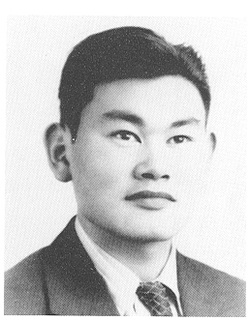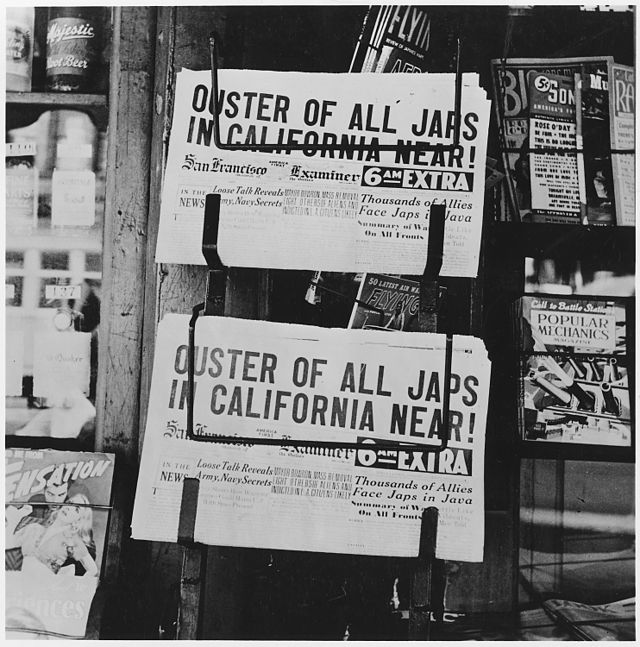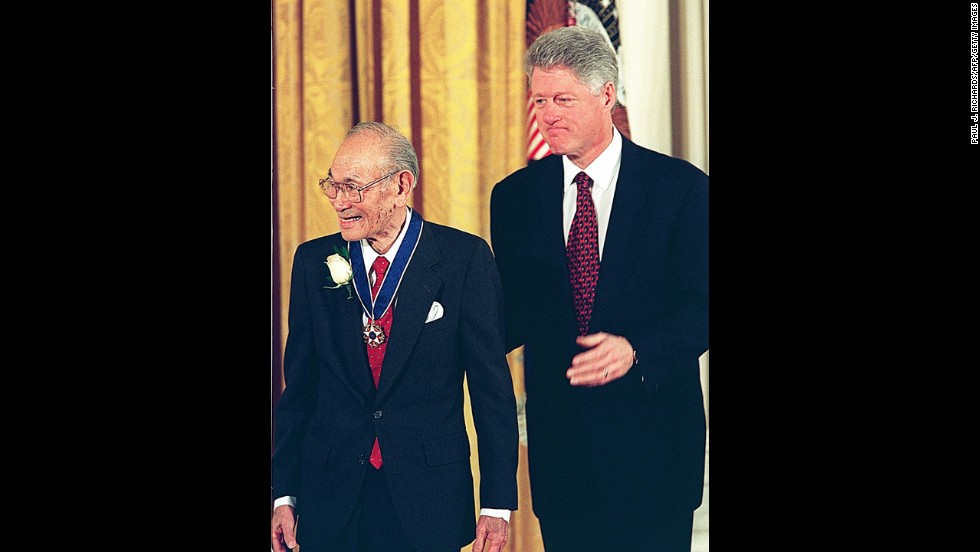


Justice Frankfurter concurred, writing that the “martial necessity arising from the danger of espionage and sabotage” warranted the military’s evacuation order. The Court upholds the constitutionality of Executive Order 9066 and the Armys exclusion. United States (1944) -iCivics Describe the American governments decision to inter people of Japanese descent during World War II Identify the. Black argued that the validation of the military's decision by Congress merited even more deference. The Supreme Court announces its opinion in Korematsu v United States. The Court relied heavily on a 1943 decision, Hirabayashi v. and particularly the West Coast (the region nearest Japan) secure from invasion. Supreme Court case in which the Court held that excluding all persons of Japanese ancestry from designated military areas was constitutional. The majority found that the Executive Order did not show racial prejudice but rather responded to the strategic imperative of keeping the U.S. Korematsus views on the importance of pursuing justice What. In an opinion written by Justice Black, the Court ruled that the evacuation order violated by Korematsu was valid. The Ninth Circuit affirmed Korematsu's conviction.ĭid the President and Congress go beyond their war powers by implementing exclusion and restricting the rights of Americans of Japanese descent? He responded by arguing that Executive Order 9066 violated the Fifth Amendment. United States (1944), the Supreme Court, in a 6-3 vote, upheld the governments forceful removal of 120,000 people of Japanese descent. Korematsu was arrested and convicted of violating the order. A Japanese-American man living in San Leandro, Fred Korematsu, chose to stay at his residence rather than obey the order to relocate. Supreme Court, on December 18, 1944, upheld (63) the conviction of Fred Korematsua son of Japanese immigrants who was born in Oakland, Californiafor having violated an exclusion order requiring him to submit to forced relocation during World War II. 214 CERTIORARI TO THE CIRCUIT COURT OF APPEALS FOR THE NINTH CIRCUIT Syllabus 1. President Franklin Roosevelt signed Executive Order 9066 in February 1942, two months after Pearl Harbor. United States, legal case in which the U.S. 22 Argued October 11, 12, 1944 Decided Decem323 U.S. government decided to require Japanese-Americans to move into relocation camps as a matter of national security. A Narrative Analysis of Korematsu v.In response to the Japanese attack on Pearl Harbor during World War II, the U.S.

That is not to say that all such restrictions are unconstitutional. In the December 1944 landmark decision of Korematsu v United States, the high court ruled against him with a 6-to-3 decision that declared that the. oai/?verb=GetRecord&metadataPrefix=oai_dc&identifier=info:ark/67531/metadc2238 193 (1944) Rule: All legal restrictions which curtail the civil rights of a single racial group are immediately suspect. International Image Interoperability Framework (IIIF) More information about this thesis can be viewed below. It has been viewed 13773 times, with 14 in the last month. The study concludes that the narrative paradigm is …

The study reviews the Supreme Court decision to reveal its arguments and focuses on the context of the case through the presentation of the public story, the institutional story, and the ethnic Japanese story, which are analyzed using Walter Fisher's narrative perspective. 214 (1944) and its historical context, using a narrative perspective and reviewing aspects of narrative viewpoints with reference to legal studies in order to introduce the present study as a method of assessing narratives in legal settings. This thesis studies the Supreme Court decision, Korematsu v. United States (1944) Early in World War II, on February 19, 1942, President Franklin Roosevelt issued Executive Order 9066, granting the U.S.


 0 kommentar(er)
0 kommentar(er)
